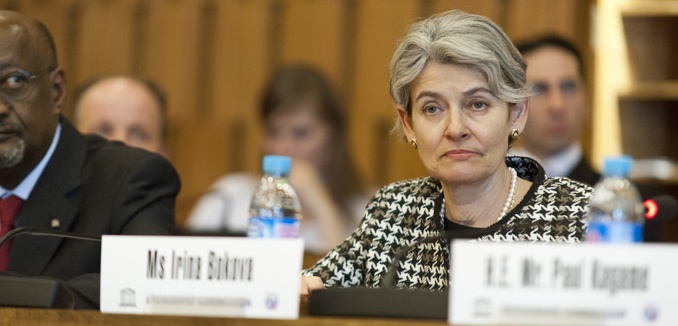A day after UNESCO adopted a resolution rejecting Jewish historical ties to Jerusalem, the agency’s director general warned that any effort “to deny, conceal or erase any of the Jewish, Christian or Muslim traditions undermines the integrity of” the city as a World Heritage site.
Irina Bokova signaled her opposition to Thursday’s resolution, which exclusively referred to the Temple Mount by its Muslim names and only acknowledged its significance to Muslims, by affirming its centrality to the Jewish faith and stressing the importance of Jerusalem to all three Abrahamic religions.
“In the Torah, Jerusalem is the capital of King David, where Solomon built the Temple and placed the Ark of the Covenant. In the Bible, Jerusalem is the city of the passion and resurrection of Jesus Christ. In the Quran, Jerusalem is the third holiest site in Islam, where Muhammad arrived after his night journey from Al Haram Mosq (Mecca) to Al Aqsa,” she explained in her statement.
“In this microcosm of humanity’s spiritual diversity, different peoples worship the same places, sometimes under different names. The recognition, use of and respect for these names is paramount. The Al Aqsa Mosque / Al-Haram al-Sharif, the sacred shrine of Muslims, is also the Har HaBayit – or Temple Mount – whose Western Wall is the holiest place in Judaism, a few steps away from the Saint Sepulcher and the Mount of Olives revered by Christians.”
Though Bokova did not explicitly mention the resolution, which was condemned by both the White House and a bipartisan congressional letter, she made it clear that attempting to undermine Jewish and Christian ties to Jerusalem ran counter to UNESCO’s mission. “When these divisions carry over into UNESCO, an Organization dedicated to dialogue and peace, they prevent us from carrying out our mission,” she stated. “UNESCO’s responsibility is to foster this spirit of tolerance and respect for history.”
After the measure passed on Thursday, Israeli Education Minister Naftali Bennett suspended his country’s cooperation with UNESCO.
Bokova’s statement echoed one she released in July after the agency postponed a vote on a similar resolution, which challenged the centuries-old links between Jews and Jerusalem.
Attempts to erase the well-established historical connection between Jerusalem and the Jewish faith, which The New York Times noted in October led many Palestinians to “increasingly [express] doubt that the [Jewish] temples ever existed,” is a phenomenon that Dore Gold, former director general of the Israel Ministry of Foreign Affairs, described as “Temple denial.” Days after the Times report, the Mufti of Jerusalem, who was appointed by Palestinian Authority President Mahmoud Abbas, claimed that the Temple Mount has been the site of a mosque “since the creation of the world” and that it never housed a Jewish temple, despite ample evidence to the contrary.
David Hazony, editor of The Tower, wrote in 2007 that “Palestinian leaders, writers, and scholars have embarked on a campaign of intellectual erasure […] aimed at undermining the Jewish claim to any part of the land.”
The official Palestinian position—as expressed in the Palestinian National Charter posted on the website of the Palestinian Authority’s United Nations delegation—is that “the claims of historic and spiritual ties between Jews and Palestine are not in agreement with the facts of history or with the true basis of sound statehood.” At the Camp David summit in 2000, then-Palestinian leader Yasser Arafat unsettled President Bill Clinton by denying that there had ever been a Jewish temple in Jerusalem. Arafat’s successor, Mahmoud Abbas, has repeatedly and explicitly lashed out against suggestions that Jews have links to Jerusalem, which is mentioned by name over 600 times in the Jewish bible.
Jewish, Christian, and other non-Muslim visitation to the Temple Mount currently remains highly restricted. The Islamic Waqf, which administers the site, only allows non-Muslims to use one of the complex’s eleven entrances, and non-Muslims are forbidden from praying, singing, or making any kind of religious display.
[Photo: ITU Pictures / Flickr ]




